 Humans
Humans  Humans
Humans  Animals
Animals 10 Species That Refused to Go Extinct
 Weird Stuff
Weird Stuff 10 Weird Things People Used to Do at New Year’s
 Our World
Our World 10 Archaeological Discoveries of 2025 That Refined History
 Weird Stuff
Weird Stuff 10 Fascinating Facts You Might Not Know About Snow
 Miscellaneous
Miscellaneous Top 10 Things Crypto Was Supposed to Change & What Actually Did
 History
History 10 Huge Historical Events That Happened on Christmas Eve
 Music
Music 10 Surprising Origin Stories of Your Favorite Holiday Songs
 History
History 10 Less Than Jolly Events That Occurred on December 25
 Weird Stuff
Weird Stuff 10 Funny Ways That Researchers Overthink Christmas
 Humans
Humans 10 Unsung Figures Behind Some of History’s Most Famous Journeys
 Animals
Animals 10 Species That Refused to Go Extinct
 Weird Stuff
Weird Stuff 10 Weird Things People Used to Do at New Year’s
Who's Behind Listverse?

Jamie Frater
Head Editor
Jamie founded Listverse due to an insatiable desire to share fascinating, obscure, and bizarre facts. He has been a guest speaker on numerous national radio and television stations and is a five time published author.
More About Us Our World
Our World 10 Archaeological Discoveries of 2025 That Refined History
 Weird Stuff
Weird Stuff 10 Fascinating Facts You Might Not Know About Snow
 Miscellaneous
Miscellaneous Top 10 Things Crypto Was Supposed to Change & What Actually Did
 History
History 10 Huge Historical Events That Happened on Christmas Eve
 Music
Music 10 Surprising Origin Stories of Your Favorite Holiday Songs
 History
History 10 Less Than Jolly Events That Occurred on December 25
 Weird Stuff
Weird Stuff 10 Funny Ways That Researchers Overthink Christmas
Top 10 Ways Coronavirus Will Change Your Life Forever
“Equality,” historian Walter Scheidel once wrote, “was only ever brought forth in sorrow.”
At this moment, COVID-19 is sweeping through the world and the global economy appears to be collapsing. This, without question, is one of those times of sorrow—a period when our lives are upended and filled with uncertainty.
Top 10 Crazy Conspiracy Theories Surrounding The Chinese Coronavirus
But as more and more people adjust to life in quarantine, we are starting what’s becoming a global social experiment. Ideas that we only talked about in the years before are being put into action on a massive scale.
This is going to be a difficult time — but it’s also going to the spark of some incredible changes.
10 Working from home
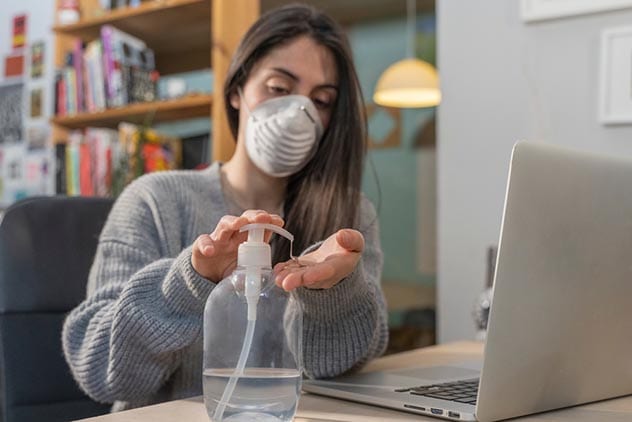
Before COVID-19, only 7% of American workers had the option to work from home.[1] That doesn’t mean that 7% were working from home — it just means that 93% of Americans were told that it would never be an option.
Today, working from home is a necessity. There are no hard statistics on how many people are working remotely around the world, but the company Cisco has said that, in China, their video conferencing software has been seeing 22 times as much traffic as it did before the outbreak.[2]
The world is engaged in a global work-from-home experiment — and we’re going to see first hand just how sustainable it is.
There are already studies on this, and the results are very positive. One found that people working from home have 16.8 more days worth of productivity a year.[3]
Those studies have always been out there — but if employers see the results first-hand for themselves, there’s going to be no denying that letting people continue working from home after the pandemic is over isn’t going to send them out of business.
And that could be incredible for our life satisfaction. The average commute to work has increased by 20 minutes over the past decade[4] — and experts say that those 20 minutes affect job satisfaction as much as a 19% cut in pay.[5]
9 Universal basic income
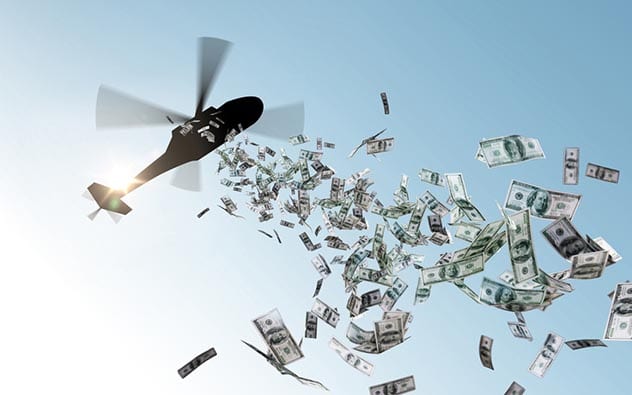
A few months ago, universal basic income seemed like a pipe dream. The idea of sending every person in a country a monthly check, even if they don’t go to work, was starting to crop up on the odd campaign trail — but in most countries, it didn’t sound like anything we’d see any time soon.
But for the next few months, it’s going to be a reality. The United Kingdom has committed to paying 80% of its workers’ salaries,[6] while Denmark has offered to pay upward to 90%.[7] And even the United States is planning on sending a $1,200 check to almost every adult American.[8]
None of these plans are exactly the same as universal basic income—but they’re close. They’re going to effectively be dry test runs on how these policies really affect society.
It’s too early to say what the result is going to be. Finland tried universal basic income in 2017 and 2018 and concluded that it left people “happy but jobless”,[9] which might be what we find in the rest of the world, as well. But one way or another, these debates are going to be a lot less theoretical when the pandemic is over.
8 Automation

One of the sectors COVID-19 has hit the hardest is manufacturing. Anyone working in a factory is an incredibly tough spot. Working remotely isn’t an option when you work with your hands—but for some factories, neither is staying home.
But for so-called “lights out” factories that are operated entirely by robots, a disease isn’t even a problem.
Companies that use more automation are already doing better than those that rely on cramming human workers into a tightly-packed factory,[10] and companies are starting to notice. Caja Robotics, for example, has said that they’ve seen a 25% increase in inquiries in the past 30 days alone.
We can expect a lot of manufacturing companies to turn to automation to survive — and a lot of other companies, too.
China has already started replacing delivery drivers with drones,[11] and they’re reporting that they’re faster and safer than human workers.
They’ve even experimented with robotic hospitals,[12] where machines take your temperature, deliver your meals, and disinfect your room to keep humans from having to come into contact with someone carrying a disease.
By the time this pandemic is over, your job just might have been filled by a robot.
7 Online learning

Schools are shutting down in nearly every country that’s seen an outbreak of COVID-19 — and that’s pushing parents into teachers into a whole new era of education.
For the next few months, online learning is going to be the norm. No matter how tech-savvy your teacher is, they’re going to have to learn how to make education digital.
Based on early reactions, it’s unlikely that we’ll see widespread adoption of online education when this is over. Feedback from teachers, so far, has been almost universally negative.
The major problem is that online learning compounds disadvantages.[13] Children whose parents don’t have time to push them on their education fall further behind, while those who can’t afford internet access are almost completely excluded.
Still, every teacher in the world is getting a crash-course in 21st-century learning. They’re guaranteed to come back with ideas that’ll transform how our kids learn.
At least — for the kids that come back. A lot of parents are turning to homeschooling,[14] and since homeschooled kids typically score higher on standardized tests than kids in public schools,[15] there’s a good chance that a lot of those parents will decide to stick with it.
6 The rise of big government

“There are no Libertarians in a pandemics,” Meghan McCain recently said.[16]
Whether that’s a good thing or not is up to debate — but good or bad, there’s a lot of reason to believe that it’s true. Around the world, people have been embracing big government ever since COVID-19 began to spread.
Socialist policies are being implemented all around the world, even in countries led by conservative and libertarian leaders. The US government is planning on spending $1 trillion.[17] fighting COVID-19, while the United Kingdom’s Boris Johnson has said that there’s no ceiling to how much they’ll spend.
Big government’s making a comeback — and in some places, it’s in pretty extreme ways.
The Israeli government has started using its people’s cell phone location data to identify everyone who has come in contact with an infected patient.[18] If you’ve been near them, you’ll get a text telling you to quarantine yourself immediately.
McCain’s being hyperbolic, of course. There are still Libertarians — but their voices are being muted. And even if hands-off government comes back in fashion when this is over, there are bound to be a few bills passed that, before COVID-19, never would have made it through.
Top 10 Crazy Facts About The Coronavirus Outbreak
5 Voting by mail
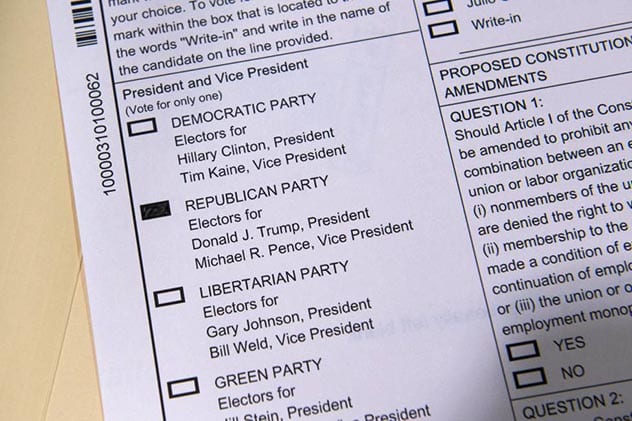
On April 15th, with a pandemic ravaging their country, the people of South Korea are going to have to line up outside of booths and cast their votes in the 2020 election.[19]
It’s going to be a huge problem—and the country hasn’t really had time to react. So far, their solution is awful. They’re going to require voters to wear masks and disposable gloves, and they’re going to check everyone’s temperatures before allowing them to enter.
It’s going to be a disaster. We can count on the voter turnout being abysmal, and it’s going to be a wake-up call for the rest of the world.
It’s especially going to affect the United States, where primaries are already underway and a federal election is scheduled in November. Americans are going to have to change their voting rules this year — and we can expect those changes to be permanent.
2 in 3 Americans already say they’re worried about voting in person,[20] and some are already fighting for change. Texas Democrats have filed a lawsuit for the right to vote by mail,[21] while other states are encouraging people to exclusively mail in their ballots.[22]
Which could be great for democracy. When Utah introduced voting by mail, they saw a 7% increase in voter turnout.[23]
4 The death of small businesses

A lot of companies are being hit hard right now — but nobody as hard as bars and restaurants.
France, Spain, Italy, Germany and the United Kingdom are just a few countries that have shut down all bars and restaurants,[24] and, in countries that haven’t mandated it, few people are choosing to go out for drinks.
For the next few months, these businesses and their employees are going to be stripped of any revenue stream that doesn’t come from the government. A lot of them aren’t going to be able to survive it.
J.P Morgan predicts that the average small business will only be able to survive 27 days of this before going bankrupt.[25]
That’s going to change the face of our world — because, while a lot of local pubs aren’t going to survive, the big companies are going to persevere.
When people get an appetite to go wining and dining again, and when servers start looking for work again, the big chains will still be there. McDonald’s will weather the storm — and that’s going to reshape our world.
Currently, about 50% of Americans work for small businesses.[26] But when this is over, that percentage will probably be a lot lower.[27]
3 The end of reliance on China
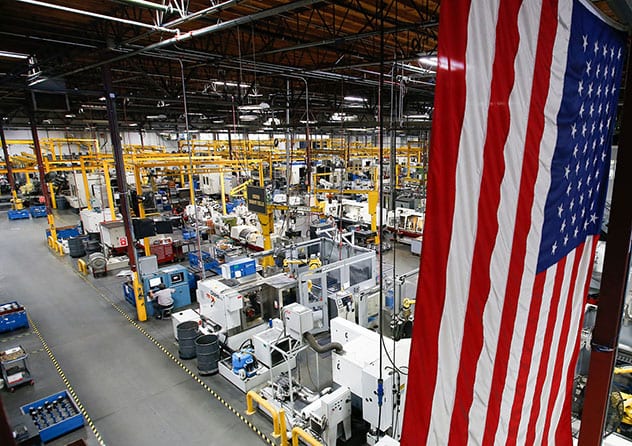
COVID-19 couldn’t have come at a worse time for China. They were in the middle of a brutal trade war, and COVID-19 has made things a lot worse.
Up until now, the world has relied on China as its manufacturing hub. They manufacture 20% of the world’s goods[28]—more than any other country on earth—and they have an even bigger role in healthcare. 90% of America’s antibiotics come from China.[29]
But as China has gone under quarantine and has struggled to keep up its pace, it’s become increasingly clear just how dangerous it is to rely on a single location to supply the world.
The world is struggling with a shortage of ventilators and face masks, and it’s just not feasible to rely on China to take care of it on their own—especially when they’ve been one of the hardest countries hit.
Several countries are already starting to bring manufacturing back into their own borders, while others are talking about spreading out their manufacturing to several different places.[30]
Right now, we really have no choice. We’re going to have to start relying on other countries for manufacturing — and that’s going to hurt China long after the pandemic is over.
2 Free and universal health care
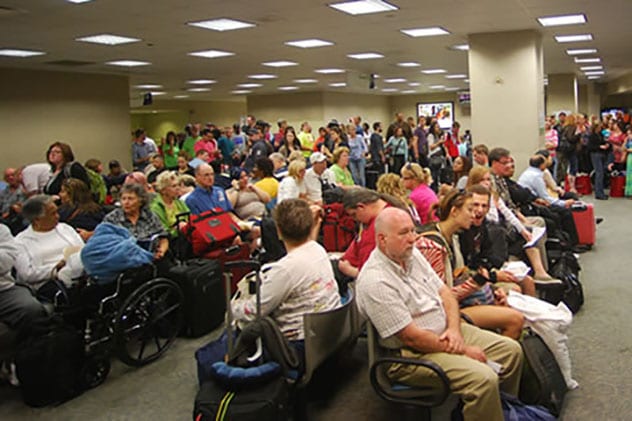
After the Spanish Flu of 1918, countries around the world, author Laura Spinney says, “embraced the concept of socialized medicine.”[31]
It was one of the lasting impacts of the last great global pandemic. People started to realize that the health of the poor affected everyone, and the first discussions that would lead to universal health care began.
There are only a handful of countries that don’t have universal health care today — and one developed nation — but this could be the moment that pushes the rest of the world into free healthcare.
41% of Americans already say that they are more likely to support universal health care in the wake of the COVID-19 pandemic,[32] and policies seem to be pushing that way, too.
The US has already pledged to let people get tested for the coronavirus free of charge,[33] and some politicians are pushing to make treatment free, as well.[34]
If treatment isn’t made free before the pandemic’s over, we’re sure to see more people demanding it. Some people have been coming home with bills as high as $35,000[35] for treatment — and there’s no way that those people aren’t going to end up demanding changes.
1 A new political uprising
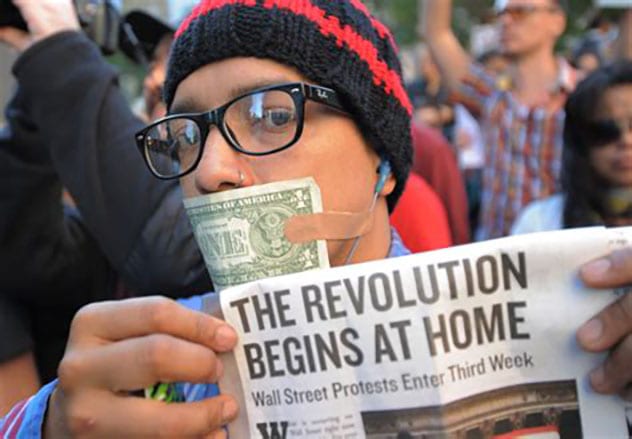
COVID-19 is hitting our health hard — but it’s hitting our economy even harder. According to analysts at J.P. Morgan Chase: “There is no longer doubt … We now think that the COVID-19 shock will produce a global recession.”[36]
A lot of people are going to lose their jobs. That analyst predicts that 400,000 Americans will become unemployed in the next few weeks alone. And before this is over, it could be even worse. Another analyst believes that, before this over, 7.4 million people in the leisure and hospitality industry will be unemployed.[37]
It’s the poor who are going to be hit hardest of all. While office workers are going to be able to work remotely from home, it’ll mostly be servers and warehouse workers that suffer through this pandemic.
That’s going to be painful — but as Schiedel said, equality was only ever brought forth in sorrow.
We’re going to learn a lot from this experience, and once we know what the real lesson of COVID-19 is, people are going to be demanding change. Experts are already predicting a revolution; one that analyst Cathy O’Neil has described as “Occupy Wall Street 2.0”.[38]
COVID-19 is going to put us to the test — but when that test is over, we’re going to have a better understanding of the cracks in our societies. And if we’re lucky, our world just might wind up a better place.
Top 10 Essential Facts About The Coronavirus, The Only Article You’ll Ever Need About COVID-19








